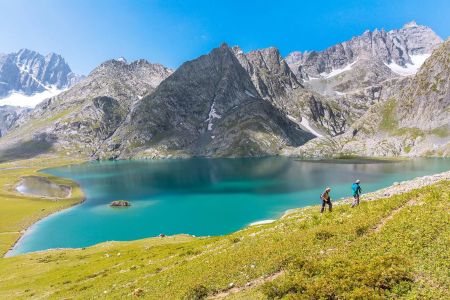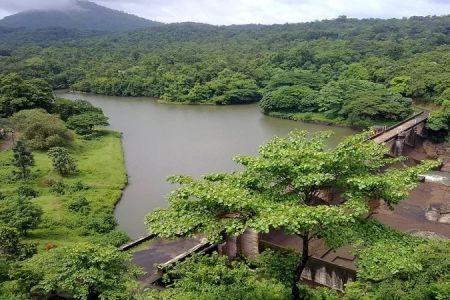Exploring India’s Best Eco-Tourism Destinations for Sustainable Travel
1. Kerala: The Green Paradise of India
Kerala, often called "God’s Own Country," offers some of the best eco-tourism experiences in India. With its lush rainforests, serene backwaters, and vibrant wildlife, Kerala is a hub for sustainable tourism. Visitors can engage in responsible travel practices by choosing eco-friendly accommodations like treehouses or homestays. Notable eco-tourism projects like The Vembanad Wetland provide travelers with opportunities to explore biodiversity while preserving the local ecosystem. A boat ride in Kerala’s backwaters, for example, not only lets you enjoy nature but also supports community-led conservation initiatives.
Travel Story: Emily, a traveler from the UK, visited Kerala's Periyar Wildlife Sanctuary and was awestruck by the pristine environment. She spent a day walking through the forest with a naturalist guide, learning about the region's efforts to preserve the endangered species of elephants and tigers. “I felt like I was part of the solution, not just a visitor,” she shared.
2. Himachal Pradesh: Eco-Tourism in the Himalayas
Himachal Pradesh is another top eco-tourism destination in India, known for its high-altitude landscapes and eco-conscious villages. The state promotes responsible tourism through initiatives like the Himachal Pradesh Ecotourism Policy, which encourages tourists to stay in locally-run eco-lodges and participate in sustainable activities. Visitors can explore places like Spiti Valley or Kullu, where sustainable farming, wildlife conservation, and eco-friendly trekking have become the backbone of local tourism. Himachal’s emphasis on preserving the Himalayan ecosystem makes it a perfect destination for nature lovers.
Travel Story: Andrew and Sarah, a couple from Canada, trekked through the Spiti Valley on a guided eco-tour. They were fascinated by the region’s commitment to preserving ancient monasteries and using renewable energy sources. “The locals made us feel like we were part of something larger, a movement to keep this magical land safe,” Andrew recalled.
3. Sikkim: A Sustainable Traveler’s Dream
Sikkim, a small state in Northeast India, is a pioneer in eco-tourism and one of the greenest states in the country. It was the first state in India to go fully organic, and its commitment to environmental conservation is evident in every corner of the region. Visitors can enjoy eco-friendly activities such as trekking in the Khangchendzonga National Park, a UNESCO World Heritage site, or exploring sustainable farming practices. The Sikkimese people, known for their reverence of nature, also offer insights into how eco-tourism can support local livelihoods while preserving cultural heritage.
Travel Story: Sarah, an eco-conscious traveler from Australia, visited Sikkim to experience the famous “Green Tour.” Her trip included a visit to the organic farms that supply local produce to eco-resorts. “I was amazed at how they blend sustainability with tradition. The food was so fresh, and the people were so welcoming,” Sarah said.
4. Madhya Pradesh: Wildlife and Conservation in Central India
Madhya Pradesh is home to some of India’s most famous national parks, including Kanha and Bandhavgarh, both of which are excellent examples of eco-tourism in action. These parks focus on conservation efforts to protect Bengal tigers, leopards, and other endangered species. Eco-tourism here allows visitors to engage in wildlife safaris while supporting anti-poaching initiatives and the sustainable management of the park’s resources. By staying in eco-friendly resorts near these parks, tourists contribute to local conservation and community welfare projects.
Travel Story: John, a wildlife enthusiast from the US, spent a week at a sustainable lodge near Kanha National Park. “The lodge was powered by solar energy, and the staff were all locals who participated in conservation education programs. It felt good to know that my visit was making a difference,” John reflected.
5. Rajasthan: Eco-Tourism in the Desert
Rajasthan, known for its majestic palaces and vast deserts, is also making strides in eco-tourism. While many tourists are drawn to its rich cultural heritage, the state also offers eco-conscious travelers the chance to explore its unique desert ecosystems in a sustainable way. The Thar Desert, for example, is home to numerous initiatives that aim to balance tourism with the preservation of its fragile environment. Visitors can experience eco-friendly desert safaris, stay in green resorts, and take part in solar-powered camel rides to enjoy Rajasthan’s beauty without compromising its natural resources.
Travel Story: Maria and Carlos, a couple from Spain, visited Rajasthan for a desert eco-tour. “We stayed in a solar-powered desert camp, and the experience was incredible. The guides were so knowledgeable, showing us how the desert ecosystem works and how tourism can coexist with conservation,” Maria said.












